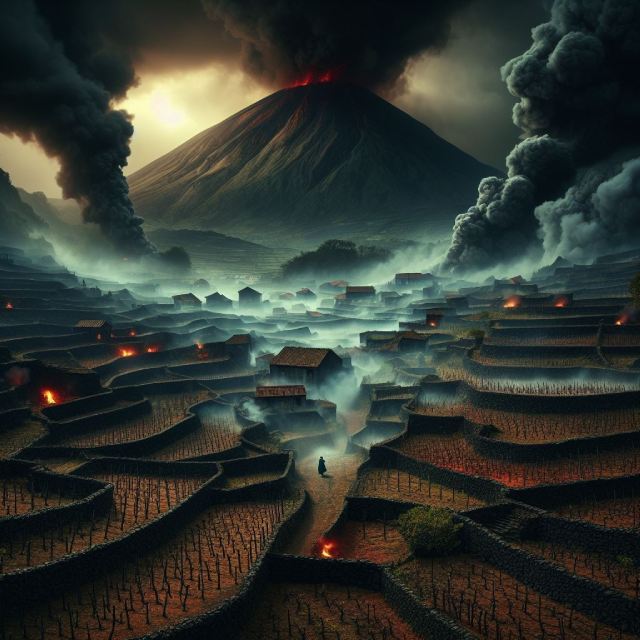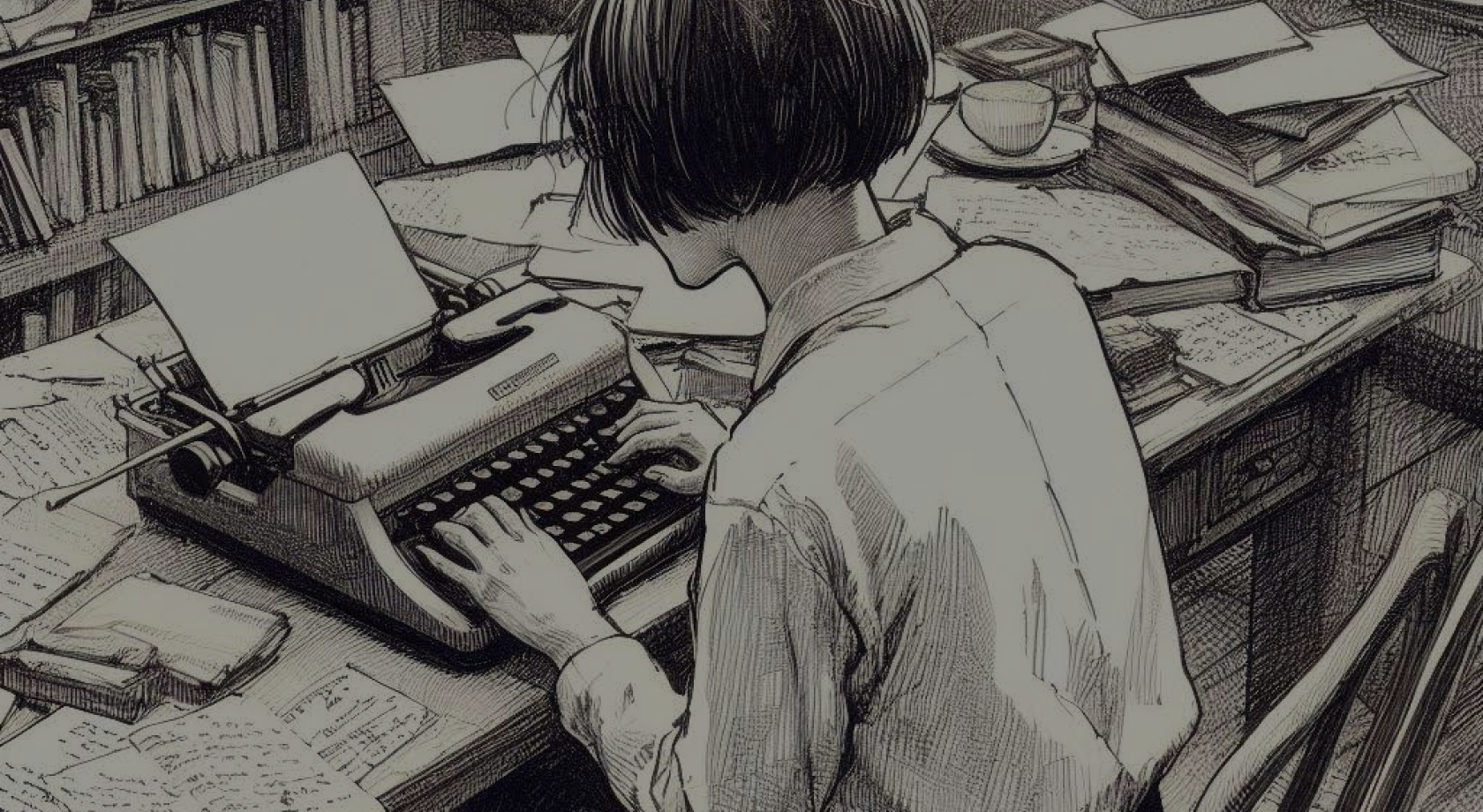Our destiny is in God's hands

The earthquakes of 1757 and 1759 caused widespread destruction on the islands of São Jorge and Picos, killing more than 1,000 people. In 1761 there was a strong volcanic eruption on Terceira Island. Francisco's parents and his middle brother died in this catastrophe. Some time later, news of the volcanic eruption in the Azores reached Brazil. However, in Desterro, there were no details of what had happened there. Finally, three months after the eruption, Francisco received a letter telling him that his parents had died and that his older brother were now the owner of the lands on Picos Island and the properties on Terceira Island.
"As if losing my parents wasn't enough, I've lost all connection with my homeland. Now I don't even have a place to stay if I ever want to go back to Portugal. This is a terrible injustice, Alda Maria. I only inherited my father's name. But I already knew that one day this would happen".
The news from Portugal had made him deeply angry. "At such times there's no better place to drown your sorrows than the tavern. I'll see if I can find my army friends there," said Francisco to his wife, as he turned his back indifferently to her pleas and left the house slamming the door.
Two years later, during the Spanish invasion of Villa do Rio Grande, the Portuguese settlers, disgusted with their king, had deserted the troops, handed over arms and ammunition to the Castilians and acclaimed the enemy king. Francisco, who had come with his troops to protect the southern lands against the Spanish invasion, had met Manuel in the midst of the battlefield. At the end of the war, the Spanish were expelled and the king of Portugal was convinced by his ministers to keep his promises to the settlers, which brought peace back to the inhabitants of the place.
When the troops returned to Desterro, Francisco decided to stay behind to see what life was like in the south and whether he would like to move here. "You don't know how good it was to meet you again, man of God. Did you hear that my parents died during the volcanic eruption of 1761? I miss those times when we lived in the islands so much! Sometimes I feel such pain in my chest that I almost cry. Life there in Desterro is good, but here in Rio Grande, among these brutish people, who don't know the laws of God or man... You can hardly tell them apart from the beasts that live hidden in the woods! I can't imagine how you can live so alone, Manuel? At least you could have found a good woman to marry you, couldn't you?".
As they lived together on a day-to-day basis, the two had become confidants and did almost everything together. Manuel now wore the clothes he had received from Francisco when he left Picos Island for Brazil, and this made him considerably more elegant than the locals. Everyone in the village had forgotten that he had arrived in Brazil as a convict. A large part of the village believed him to be of noble origin, given the success he had achieved in cultivating his land and his close friendship with Francisco, who treated him like a brother.
After a few months' delay, Francisco finally left Manuel's farm, where he was staying, and set off in the direction of Desterro with a group of cart drivers, who were transporting the harvest from the farms in the south to the ports, from where it would be shipped to Portugal. After two months traveling the dirt roads, he finally arrived in Desterro. "Alda Maria, I bumped into a childhood friend in Villa de Rio Grande. His name is Manuel. He worked on my father's land, where he was the foreman. I grew up bathing in the lake, climbing the Picos Mountains and supervising the grape harvest with him. Those were good times," Francisco commented to his wife, his face radiant and deflated. During his time in the south, he had regained his old shape: he had lost his belly, started drinking less and now talked to her in a slightly sweeter tone than the one he had used recently, before the Spanish invasion.
"I showed Manuel your painting and he said you were very beautiful, that you reminded him of the women in his family. He sent his regards and said he'd be delighted to host us when we move to our new lands in the south". "Yes, we will, man. I'm very happy with this new chance that fate is giving us. Who knows, maybe we'll even have a child? You could invite your friend to be the godfather." "Yes, who knows," replied Francisco without much hope. "And you could take a friend of yours with us. Manuel needs a good companion. Alda Maria smiled in admiration as they both continued to make plans for the future. At the moment, life was much better than it had been in recent years, when she had been sidelined in exchange for short-lived adventures. What did the future hold for the two of them? "I have the impression that I already know your friend Manuel because you talk about him so much. I think we'll get on very well.
In 1767, the king ordered that the necessary measures be taken to settle the colonists and fulfill his promises, and finally in 1773, 60 couples were settled in Rincão do Carro, situated on the edge of Lagoa dos Patos, a little further north of Villa de Rio Grande. On this occasion, Alda Maria saw her husband leave for the Province of Rio Grande to take possession of their land. In the first year that Francisco lived in Rincão, he received a lot of help from Manuel, who came from Villa de Rio Grande to help him build his house and organize the slaves' chores. A year later, Alda Maria moved into their new home.
Life in the South was hard, but not without its charms. The 60 families who came together to Rincão supported each other and celebrated religious holidays, weddings and baptisms together. Manuel also came to visit them often, as his farm was only four days away on horseback.
Little by little, Alda Maria and Manuel grew closer. She already considered him a member of her family and someone she could rely on when she needed help, as her husband wasn't always available. In the first two years of the settlement, Francisco had dedicated himself wholeheartedly to exploiting his land and expanding his house to meet Alda Maria's demands. Now, however, he was back to drinking and looking for other women. "I don't understand why you're so unhappy, woman. Can't you see that I've done everything possible to please you?". But Alda Maria often woke up at sunrise to the sound of the horse's hooves bringing her still-drunk husband home, barely staying in the saddle. He came from the tavern smelling of cheap smoke and the perfume of a whore. Two years after his wife came to Rincão, he fell ill again with lung disease due to his unhealthy lifestyle. This time he would be treated by his wife and Manuel, who, taking advantage of the rest period after the harvest, would spend more than a month away from home, helping to look after Francisco's farm.
"You're a very strong woman, Alda Maria, an example of dedication. Have I ever told you that you remind me of the women in my family? When I'm with you, I feel at home, at ease. If I met a woman like you, I'd get married right away. Alda Maria, embarrassed, didn't know what to say. As Francisco's health worsened, Alda Maria and Manuel grew closer. Until, at the age of 38, twenty years after meeting Francisco, she finally became pregnant. This news struck the two lovers like a bolt from the blue. It was difficult to explain this pregnancy to her husband.
Shortly afterwards, a letter arrived in Francisco's hands. In it, he was told that his older brother had also died. Francisco was now the only heir to all his family's assets in Portugal, since everyone else had died and his brother had left no offspring. That same evening, recovered from his illness as if by a miracle, Francisco couldn't be overjoyed. "We'll finally have the life I deserve. Alda Maria, prepare our bundles, because we're going back to Portugal on the first ship. We're rich. Rich! We're going to leave these difficult lands behind and return to our homeland. But before that, I'm going to celebrate. So long Alda Maria, I'm going to celebrate our return to our homeland with my friends from the tavern. I'm going to tell everyone that we're now rich wine producers and landowners. No more of this difficult life. Enough! Shortly after receiving the news, he set off in the direction of the village, galloping along the edge of the forest that flanked the farm.
Alda Maria and Manuel stayed behind, unhappy. Now that they had both discovered their love, there would be a whole ocean between them. They would probably never see each other again... And how could she explain her pregnancy to Francisco, who no longer looked for her in bed? "Don't cry, Alda Maria. You make me desperate. I don't know what to do. Perhaps you could let him go to Portugal alone and stay here with me on my farm. Your life would be harder, because I don't have any riches to offer you. I only have my love. Besides, he doesn't appreciate you; he's always chasing other women". "If it weren't for this child I carry in my womb, I would kill myself with shame. But how could I abandon my husband, if marriage is a sacred bond? Our destinies are in God's hands, it's not up to us to decide," Alda Maria replied tearfully.
At five o'clock in the morning, the two of them were still on the porch of the house, she with her eyes swollen from crying. So busy were they with their personal drama that they didn't even notice that the sky had begun to lighten on the horizon, tinged with pastel colors that were reflected in the waters of Lagoa dos Patos. Flocks of birds passed silently over their heads, heading south to mate. Suddenly, they were surprised by the sound of a horse's hooves against the hard earth of the road and remembered that it was time for Francisco to come back from his binge. But when they looked up towards the sound of the gallop, instead of Francisco, they saw a slave coming desperately and barely holding on to the animal's harness. When he got off his horse, Cosme, the slave who always rode with Francisco, began to cry, without either of them being able to understand what he was saying. When he finally calmed down, he was able to recount the tragedy: "Dona Alda, it wasn't my fault. I didn't have a gun to defend him. And the boss was too drunk to get a clear shot at the jaguar. The shot was lost in the air, and now the boss and his horse are dead on the road. The jaguar escaped... It wasn't my fault, I swear!"
Eight months later, Alda Maria's son would be born and registered as Francisco's child, despite the rumors that began to circulate around the settlement. After two years of widowhood, Alda Maria and Manuel finally got married. When he turned 18, her firstborn would cross the ocean in the opposite direction and take possession of the property inherited by Francisco in Portugal. The rest of the couple's children would live in Brazil with their parents and would eventually become one of the richest and most respected families of Portuguese origin in the Province of Rio Grande.
Voltar
